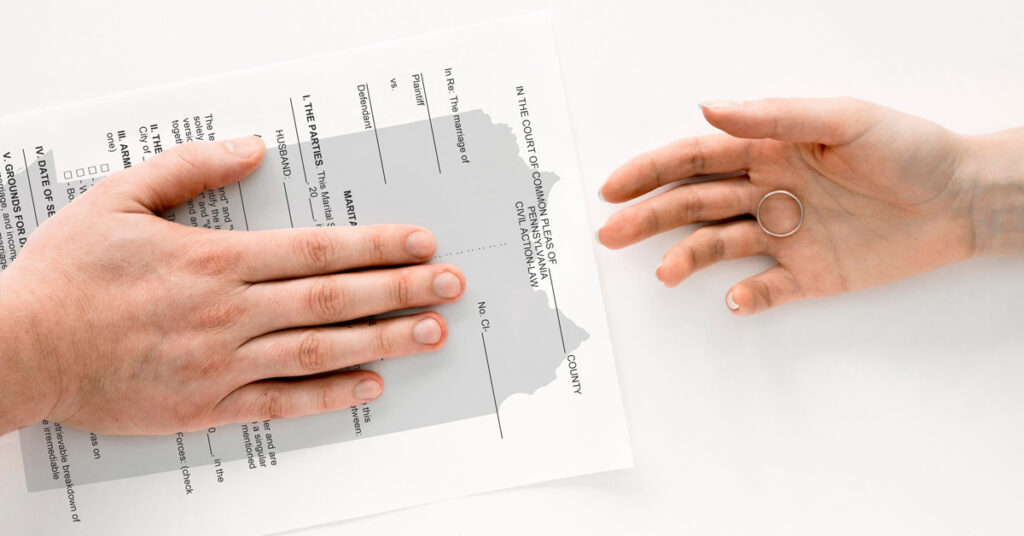Divorce in Massachusetts is complicated. A Massachusetts divorce checklist helps streamline the process, reduce complexity, and even shorten the timeline you face.
Going through a divorce in Massachusetts can feel overwhelming. Whether you and your spouse agree on everything or are preparing for a contentious legal battle, the process involves many steps, documents, and deadlines. Missing even one can cause delays, legal complications, or costly mistakes.
This step-by-step divorce checklist walks you through the full Massachusetts divorce process, from the decision to file to the final court judgment. You’ll learn what documents to prepare, when to serve your spouse, how to meet financial disclosure requirements, and what to expect during court hearings. Note that this guide applies to both Uncontested Divorce (1A) and Contested Divorce (1B) proceedings.
If you’re not sure where to begin, we recommend starting with our Massachusetts family law hub for background on the legal process, forms, and attorney guidance.
Step 1 – Choose the Right Divorce Process
It’s important to choose the right divorce process. This will affect everything that comes later, and choosing the wrong one will cost you time, money, and hassle.
You’ll need to decide whether to file an Uncontested Joint Petition (1A) or a Contested Complaint for Divorce (1B).
- Choose Uncontested Divorce (1A) if you and your spouse agree on all terms (custody, support, assets). You’ll file jointly and attend one hearing.
Learn about the 1A process.
- Choose Contested Divorce (1B) if there are unresolved issues. One spouse files a complaint, and the court issues a summons to start the process.
See what to expect in a contested divorce trial.
Note that uncontested divorces can turn into contested divorces once the process starts, so be prepared for this.To file in Massachusetts, at least one spouse needs to meet the residency requirement, and you also need to have grounds for divorce, like an irretrievable breakdown of your marriage....

Step 2 – Gather Required Documents
Before filing, collect all documentation you’ll need for disclosures and court proceedings. These include:
- Certified marriage certificate (from the city or town where you were married)
- Birth certificates for any children
- Financial documents: tax returns, pay stubs, bank and retirement account statements, mortgage documents, credit card balances
- Insurance and debt documentation
These will be used during the Rule 401/410 financial disclosures phase.
Review the full disclosure details here.
Step 3 – Fill Out and File Initial Divorce Paperwork
The bulk of any divorce is the paperwork. This is where you spell everything out, from who the plaintiff is to what your parenting plan will be if there are children involved. It’s important that your paperwork is filled out completely and accurately, and that it’s filed correctly, too.
The paperwork you’ll need depends on the type of divorce:
For the 1A Joint Petition, you’ll file:
- Joint Petition for Divorce (CJ-D 101B)
- Affidavit of Irretrievable Breakdown
- Separation Agreement
- Financial Statements (Rule 401/410)
- Affidavit of Care and Custody (if children are involved)
For a 1B Contested Divorce, the plaintiff spouse files a complaint, using:
- Complaint for Divorce (CJ-D 101)
- Summons and Tracking Order (issued by the clerk)
- Affidavit of Care and Custody (if children are involved)
- Military Affidavit
- Motion for Temporary Orders (if immediate support/custody relief is needed)
Divorce in Massachusetts can be more than a little complicated.
Learn more about divorce filing here.
Step 4 – Serve Your Spouse
After filing, you must serve your spouse with the divorce papers within 90 days. Use a constable or sheriff, who will deliver the documents and provide a Return of Service for court records. Don’t try to serve your spouse yourself.
If your spouse cannot be located, you may need to file a Motion for Alternative Service. This lets you serve by publication or certified mail. Serving by publication involves using newspapers in the area where your spouse was last known to live. Depending on the situation, serving by priority mail may be a better option.
Learn more about the service of process.
Step 5 – Submit Rule 401/410 Financial Disclosures
Submitting your financial disclosures is a very important step for both you and your spouse. These documents explain each spouse’s financial situation in detail and help lay the groundwork for things like child support, asset division, who gets the family home, and much more.
Under Probate and Family Court rules, both parties must exchange full financial disclosures:
- Rule 401: Requires a financial statement, including income, expenses, assets, and debts
- Rule 410: Mandates supporting documents like tax returns, pay stubs, and bank statements
Attorneys submit these forms for transparency in asset division, alimony, and child support. However, you’ll need to provide the information to your attorney in the first place.
Get full instructions on disclosures here.

Step 6 – Attend Court Hearing & Request Temporary Orders
Depending on the specifics of your divorce, you may need to attend a court hearing early on for temporary orders. It’s important that you not miss this hearing, as it will affect the rest of the divorce process.
During the early stages of a contested divorce, either party can file Motions for Temporary Orders. These can address:
- Child custody and parenting time
- Child support and/or alimony
- Use of marital home or shared property
- Restraining orders
Bring evidence that your attorney will need, like affidavits and financials. The judge may issue temporary rulings until the final decision at this point (think child support and parenting time). Not clear on what’s involved with temporary orders?
Get important temporary order information here.
Step 7 – Create Parenting and Financial Agreements
Next on the Massachusetts divorce checklist is creating parenting and financial agreements. These are complex topics, and they can involve difficult discussions and decisions. Many spouses find it easier to work with a mediator or through their attorneys.
You’ll need to resolve the following issues before final judgment:
- Parenting Plans: Define where children live, visitation schedules, holidays, and decision-making responsibilities.
See parenting plan tips here.
- Asset Division: Massachusetts follows equitable distribution, not automatic 50/50 splits.
Understand how property is divided so that you can make informed decisions here.
- Alimony and Child Support: Both alimony and child support are based on income, custody, and the needs of the spouse and/or child(ren).
- Retirement Accounts: Handling retirement accounts in a divorce may require a Qualified Domestic Relations Order (QDRO) to divide the money.
During this process, parents draft agreements (usually with the help of an experienced divorce attorney) and judges review them for fairness and child wellbeing. If the judge does not think the agreements are fair or in the best interests of the child, expect them to be rejected.
Step 8 – Prepare for Final Hearing or Trial
The preparation you put in before the final hearing or trial will differ depending on the type of divorce you’re pursuing (uncontested or contested). However, both require a significant amount of work that’s better handled by an experienced divorce attorney.
In a 1A case, you’ll attend a simple hearing. Both spouses will confirm that the Separation Agreement is fair and voluntary.
In a 1B case, if no settlement is reached, you’ll proceed to trial. This involves:
- Submitting a Pretrial Memorandum
- Listing exhibits and witnesses
- Presenting evidence on custody, support, or asset disputes
If children are involved, the court may appoint a Guardian ad Litem to investigate and make recommendations. Not clear on what to expect in terms of the process with a contested divorce trial? Step 8 – Prepare for Final Hearing or Trial
The preparation you put in before the final hearing or trial will differ depending on the type of divorce you’re pursuing (uncontested or contested). However, both require a significant amount of work that’s better handled by an experienced divorce attorney.
In a 1A case, you’ll attend a simple hearing. Both spouses will confirm that the Separation Agreement is fair and voluntary.
In a 1B case, if no settlement is reached, you’ll proceed to trial. This involves:
- Submitting a Pretrial Memorandum
- Listing exhibits and witnesses
- Presenting evidence on custody, support, or asset disputes
If children are involved, the court may appoint a Guardian ad Litem to investigate and make recommendations. Not clear on what to expect in terms of the process with a contested divorce trial? Step 8 – Prepare for Final Hearing or Trial
The preparation you put in before the final hearing or trial will differ depending on the type of divorce you’re pursuing (uncontested or contested). However, both require a significant amount of work that’s better handled by an experienced divorce attorney.
In a 1A case, you’ll attend a simple hearing. Both spouses will confirm that the Separation Agreement is fair and voluntary.
In a 1B case, if no settlement is reached, you’ll proceed to trial. This involves:
- Submitting a Pretrial Memorandum
- Listing exhibits and witnesses
- Presenting evidence on custody, support, or asset disputes
If children are involved, the court may appoint a Guardian ad Litem to investigate and make recommendations. Not clear on what to expect in terms of the process with a contested divorce trial?Step 8 – Prepare for Final Hearing or Trial
The preparation you put in before the final hearing or trial will differ depending on the type of divorce you’re pursuing (uncontested or contested). However, both require a significant amount of work that’s better handled by an experienced divorce attorney.
In a 1A case, you’ll attend a simple hearing. Both spouses will confirm that the Separation Agreement is fair and voluntary.
In a 1B case, if no settlement is reached, you’ll proceed to trial. This involves:
- Submitting a Pretrial Memorandum
- Listing exhibits and witnesses
- Presenting evidence on custody, support, or asset disputes
If children are involved, the court may appoint a Guardian ad Litem to investigate and make recommendations. Not clear on what to expect in terms of the process with a contested divorce trial?
Explore the contested trial process here.

Step 9 – Wait for Final Judgment
Once you’ve attended the final hearing or concluded the trial, you’ll need to wait for the final judgment.
After the hearing or trial, the court will issue a Judgment Nisi, which is a temporary final order:
- For Uncontested Divorce (1A): It becomes a Judgment Absolute after 120 days
- For Contested Divorce (1B): It becomes a Judgment Absolute after 90 days
During this waiting period, couples can reconcile and cancel the divorce before it’s technically finalized, or they can choose to appeal. Once the Judgment Absolute is entered, the divorce is legally final. At this point, you’ll need to:
- Update shared accounts, insurance, and titles
- Review your will and beneficiaries
- Request certified copies of the judgment for future legal or financial use
Final Tips to Stay on Track
Keeping your divorce process on track requires more than a Massachusetts divorce checklist. You’ll need the help of an experienced divorce attorney, as well as a decent understanding of what’s expected of you at each stage.
- Work closely with a qualified family law attorney. Meet Michelle Murray.
- Don’t miss deadlines for financial disclosures, temporary orders, or court appearances.
- Use mediation or conciliation when possible to reduce legal fees and conflict.
- Avoid social media outbursts or any behavior that may reflect poorly in court.
- Be transparent about finances to avoid future modification or contempt issues.
For a smoother experience, explore our family law hub to read more about every phase of the Massachusetts divorce process.
An experienced family law attorney can help you draft a clear, enforceable plan tailored to your family’s needs.

Michelle Murray has devoted her practice exclusively to family law matters, focusing her efforts on assisting clients through divorce, custody, property division, child support, spousal support, and visitation issues throughout Worcester County.
